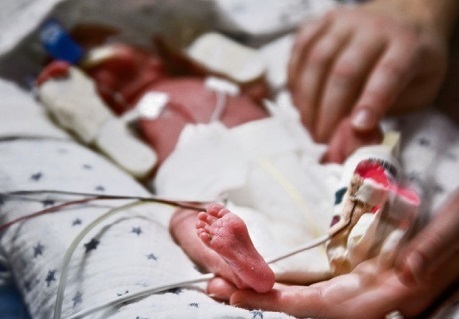Understanding how brain development and brain injury in the critically ill newborn is affected by systemic illness, is the focus of our Neonatal Neurology expertise center. With fetal and neonatal brain imaging, bedside brain monitoring and detailed multidisciplinary long-term follow-up, we help families and their children who were born prematurely or have conditions that put them at risk of an adverse neurodevelopmental outcome.
We have bench-to-bedside research strategies, to find effective therapies reducing the incidence and severity of neurological impairment caused by perinatal problems.
Family-centered care and research start before birth in close collaboration with the obstetric department. Our clinical research team is responsible for antenatal and neonatal clinical observational and intervention trials with long-term follow-up with a family-centered approach.
Care and research continue until the age of 10 years; in partnership with the pediatric rehabilitation, pediatric psychiatry and pediatric neurology center, physiotherapists and psychologists.
We are participating in the congenital heart Disease Life Span: Preventing collateral damage, by our neonatal neurology expertise in the long-term follow-up until schoolage and by running neuroprotective clinical trials, in close collaboration with the pediatric intensivist and cardiologists.
With fetal and neonatal MRI, we are participating in the Utrecht YOUth Cohort Study. This is a large scale, longitudinal cohort study that monitors the development from fetal life during pregnancy until young adulthood.
Our clinical observational trials are focusing on predicting long-term neurological and developmental deficits, in close collaboration with rehabilitation specialists, physiotherapists and psychologist. There is a continuum of care and research by close collaboration with child psychiatry and child neurology. The research field of physical and cognitive development of neonatology is part of “Healthy play and better coping” program which cross links the physical aspects of pediatrics with social and societal aspects in the strategic program Dynamics of Youth of the Utrecht university.
Next to neuro-imaging and neuro-monitoring research, digital health such as applied data analytics in Medicine (ADAM) is used in predicting adverse outcome in preterm babies.
We have an integrated program to recruit, care for and study a uniquely fragile population across perinatal care with obstetricians, pediatric neurologists, surgeons, cardiologists, radiologists, imaging experts from the institute of sciences and the Dutch connectome lab (combining methodology in acquisition and analysis). Often in collaboration in international networks, consortiums and grants with other experts in Neonatal Neurology over the world.
Together with the lab for Translational Research of Early Life Events (former: NIDOD lab) we develop bench-to-bedside perinatal (neuroprotective/neuroregenerative) research strategies.
Our interdisciplinairy team focuses on identifying the neurobiological principles that underlie the developmental disorders originating from adverse early life events and finds effective therapies that not only reduce the incidence of brain injury, but also improve outcome.
Our research lines are conntected with the The first 1001 days of a child’s life program (research theme of Dynamics of Youth, Utrecht University) focusing from conception to their second birthday, the period critical to the development of their complex brains and the cognitive skills that depend on them. The aim of this program is to get broad support for initiation of scientific knowledge and expertise to enforce this critical first phase of these infants.
Additionally, with (pediatric) psychiatric and psychologic expertise in stress we are building our national research line NEOSTRESS, around birth and later on, in an integrative family approach.
Parents of our babies are our experts. Therefore it is important to have them involved to participate, optimize and improve our research(-agenda).
Collaboration with the European Foundation for the Care of Newborn Infants (EFCNI), a network representing the interests of preterm and newborn infants and their families within Europe is key. There is collaboration between EFCNI and the Dutch Vereniging Ouders van Couveusekinderen (VOC). VOC wants to connect parents with each other and with caregivers to serve interests and inform accurately in order to give a voice and support them in the best care for their infant admitted to a hospital from birth onward. Following discharge our parents are invited to attend a meeting in our hospital with other parents to exchange experiences during and following on to their admission period.
We also collaborate with the BOSK which is the organization of and for people with an acquired physical handicap. Children who develop cerebral palsy and their parents find support through this organization. In addition this organization is involved in our research.
Parents can participate in the so called WKZ neonatal parental board. This allows us to evaluate and to be informed about specific needs of parents of our patients during care procedures and research. This will help us to improve care and research. During meetings they give advice regarding issues as, family centered care, empowerment and future research.
